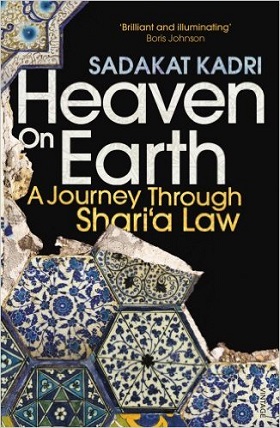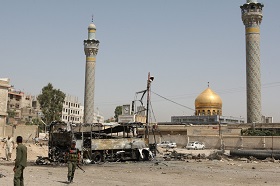At a time when extremist groups such as the Islamic State that claim to be seeking Islamic rule in the Middle East threaten global stability, the world is becoming more and more suspicious of Islam itself. The false association of Islamic Shari'a with extremist ideologies has been taken at face value by policymakers, which impedes cultural dialogue and does not help in identifying ways to counter violent extremism. In this regard, Sadakat Kadri’s book “Heaven on Earth: A Journey Through Shari’a Law” which was first published in 2012 is even more timely today than it was four years ago.
At a time when extremist groups such as the Islamic State that claim to be seeking Islamic rule in the Middle East threaten global stability, the world is becoming more and more suspicious of Islam itself. Some have gone as far as to suggest that the Shari'a law which extremists seem to have instrumentalized is a malicious legal system that has no right to be stripped of its “legality”. The false association of Islamic Shari'a with extremist ideologies has been taken at face value by policymakers, which impedes cultural dialogue and does not help in identifying ways to counter violent extremism.
In this regard, Sadakat Kadri’s book “Heaven on Earth: A Journey Through Shari’a Law” which was first published in 2012 is even more timely today than it was four years ago. The book presents a comprehensive historic perspective on Shari'a law, how and why it came to be as well as how it has changed over the centuries. An exciting mix of the author’s notes about his encounter with the Islamic tradition in different Muslim countries and a highly detailed history of Islamic law, the book makes for an excellent read, both for Muslims themselves as well as Western policy makers who fear all things Islam.
Kadri to a lesser extent goes through the norms of Shari'a law, of which there are plenty; instead he deconstructs it from the historic perspective explaining how certain events influenced its formation.
The author shows how the teachings of Prophet Muhammad gradually turned into concepts of justice. To do this, the author divides the book into two parts, first looking at the 1,400 years of Islamic history in part one “The Past” and then introducing the idea of modernity in Islam in part two “The Present.”
Modern Islamic ideologues paint two starkly different and mutually-exclusive images of Islam when it comes to discussing Shari'a. Some cite passages from the Qur’an that advocate love and compassion towards all, while others use it as a justification for the mass killing of non-believers. Both groups cite the same book and often the same passages from the book in coming to opposite interpretations.
The application of Shari’a varies across the schools of Islamic jurisprudence. There are four main schools of Sunni fiqh (jurisprudence) and two main Shia fiqh. Consequently the rules that regulate everything from simple domestic chores to the use of violence and even capital punishment are starkly different in each. Kadri’s personal encounter with Islam in different parts of the Muslim world reveals just that: modern Shari'a is not uniform across different countries and legal claims attributed to it may at times even be conflicting.
The author’s journey around the Middle East presents a juxtaposition of what the Shari’a law has been in the 7th century and today, as well as that of the theory and practice. The author explains, for example, that many of the first judges in Islam refused to decide cases fearing a mistake. On one of his trips to Karachi, Kadri learns that even today many judges avoid authorizing violence and giving death sentences. “It was as though a penalty’s existence was somehow more important than its use - and as I was to find out, his [jurists’s] view reflected an equivocation that is common across the Muslim world,” notes Kadri.
While Islam and the Shari’a law have a distinct flare of intolerance in modern political discourse, Kadri’s book is highly illuminating as it portrays Islam not as a religion of love or violence but a religion that is constantly adapting to reality. The book is full of facts that today may seem absurd to those who see the Qur’an as a source of violence and extremism. “The most striking fact … is the one that today is most likely to be overlooked: physical punishment was authorized just five times in the entire Qur’an,” Kadri writes.
The topic of the authorization of punishment in the Qur’an is indeed central in the book. The author provides compelling evidence to disprove the myth that violence is entrenched in Shari’a law. Out of fifty states with majority Muslim populations, Qur’anic penalties (hadud) are theoretically applicable in less than a dozen, most of which have been legalized in the last thirty years and whose application in practice is exceptional: “Stonings are recorded just once in Ottoman legal history - where the only known case occurred three centuries before the Prophet Muhammad’s birth, when a certain Elias was stoned according to Roman law for preaching Christianity.” Sadakat Kadri concludes that despite the track record of violent preaching, Islamic jurists have historically seen Qur’anic penalties as symbolic. Upholding them in theory has never been the same as their actual imposition.
Understanding jihad
Kadri’s book, published before the notorious Islamic State came to prominence in Iraq and Syria, is a must-read for those scholars who want to understand where exactly in the history of Islamic jurisprudence the group places its beliefs. The role of Sayiid Qutb, an ideologue of Egypt’s Muslim Brotherhood, is crucial in understanding the nature of modern jihad for that matter. According to Qutb, Muslims must follow Shari’a and Shari'a alone. Obeying means worshipping to Qutb, and if a Muslim obeys anyone but God he fails to worship God exclusively. This tenet entrenched in Sayiid Qutb’s book “Milestones” that guided the Muslim Brotherhood for many years translated into the rejection of any authority but Islam.
But the most toxic teaching in Qutb’s Milestones was that about jahiliyyah (ignorance), the word that denotes the pre-Islamic period in the Arab world. In Qutb’s view when each Muslim embraced Islam at the time of Prophet Muhammad, he had to reject jahiliyyah for it is profoundly unislamic. The Milestones, however, advanced a view of modern jahiliyyah as something corrupt and associated with the West, meaning that anyone faithfully professing Islam needs to reject anything associated with the Western way of life. Therefore Sayyid Qutb believed that the use of force is necessary against all those who in his view belong to jahiliyyah and have usurped the power of God.
And yet in his book Sadakat Kadri brilliantly deconstructs Qutb’s teachings to show that his ideas were not original in their nature and came precisely from the jahiliyyah that he was trying to reject: “The idea that people should be forced to be free originated with Rousseau, not the Prophet Muhammad. The specter haunting Milestones looked more like Marx’s capitalist alienation than the jahiliyyah. And Qutb’s belief in the righteous vanguard came straight from Lenin: for all the talk of God, salvation for the masses would come from a dedicated band of revolutionaries with a rigor sufficient to overcome the laxness of the age.”
A conflict of two interpretations of jihad still exists today and is more acute than ever. One group of Islamic scholars and jurists sees it as a purely spiritual struggle, while others attach a much broader meaning to it and see it as a struggle against non-believers [1]. Sadakat Kadri explains in his book that the Qur’an’s calls for violence all refer to “fighting” but scholars and jurists started linking the same calls to jihad. However, unlike a spiritual struggle of an individual, jihad as an act of war was a collective obligation directed by the caliph.
According to Kadri, at the time of the Crusades the caliphs of Baghdad were reluctant to refer to military resistance to Europeans as jihad. Moreover, during the ninth century non-Muslims were appointed as ministers of war twice, which alone makes the idea of jihad as a struggle against non-believers absurd.
But while the Crusades left the Muslim world fragmented, it was the Mongol invasion that largely shaped the idea of jihad as a violent response to aggression. It is this period of Islamic history that Ibn Taymiyya comes to prominence as an Islamic scholar whose interpretation of jihad would transpire through time. Ibn Taymiyya issued a fatwa in the Mamluk’s war saying that jihad against the Mongols was “an obligation of all faithful Muslims” glorifying death on jihad as martyrdom [2]. Despite the fact that the Mongol invaders had all converted to Sunni Islam they ruled according to man-made laws as opposed to the Shari’a, meaning that they lived in a state of jahiliyyah. “The response to Mongol encroachments then confirmed just how far from its origins the concept of jihad had travelled,” says Sadakat Kadri.
One of the classical Sunni jurists Maliki school of Islamic jurisprudence defined jihad as a war “waged by a Muslim against a disbeliever, with whom he has no oath, to raise the word of God Almighty, or against his presence in or penetration into the [Muslim] territory.” [3] This definition essentially means that jihad is lawful in Islam only for the purpose of suppressing aggression, a view supported by the majority of Muslim jurists. In that regard the Qur’an specifically says that “To those against whom war is made, permission is given (to fight).”
Out of 12 works by Muslim scholars republished by the Islamic State, seven are by Muhammad Ibn Abd Al Wahhab, the 18th-century jurist, whose teachings serve as the basis for the Saudi legal system. One may ask then how did the Islamic State and other extremist groups operating in the Middle East today manage to put Shari’a that explicitly limits the use of force to their service.
Today’s calls of the Islamic State to wage war against the West appeal to the same sentiments of Muslims that made them oppose the Crusades, the Mongol invasion and the European colonial rule, all of which Kadri discusses in his book. Much like Ibn Taymiyya, the Islamic State ideologues idolize death and martyrdom by cherry-picking Islamic scripture as a justification, which is more often than not taken out of context to justify the killing for a dubious cause.
1. Michael Chertoff, “The Ideology of Terrorism: Radicalism Revisited
,” in The Brown Journal of World Affairs, ol. 15, No. 1 (Fall/Winter 2008), p 12.
2. Sadakat Kadri, “Heaven on Earth: A Journey Through Sharia Law,” The Bodley Head London, p 131.
3. Alireza Hassni, Ebrahim Esmaeili, “The role and status Peaceful coexistence Islam and International Law,” in Journal of Science and Today’s World, 2013, volume, issue 6, p 755







